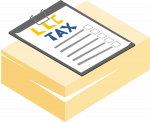Kansas LLC Taxes
By default, Kansas LLCs are taxed as pass-through entities, meaning the LLC does not pay federal taxes directly. Pass-through entities have revenue from the business passed to the members, who then pay the state personal income tax rate of 3.5%, 6.25%, or 6.45% on the earnings, depending on the amount of earnings. Members of an LLC are taxed at the 15.3% federal self-employment tax rate (12.4% for social security and 2.9% for Medicare). You may elect for your Kansas LLC to be taxed as a corporation, but you’ll still need to pay sales tax and any applicable local taxes. We break down the taxes you’ll pay operating a Kansas LLC.
In this article, we’ll cover:


How Are Kansas LLCs Taxed?
If your LLC is a single-member LLC (SMLLC), you’ll file taxes as a sole proprietorship, while multi-member LLCs are taxed as partnerships by default. Here are the federal tax forms that LLCs need to file:
- Single-member LLC—Form 1040 (usually Schedule C, but some SMLLCsfile C-EZ, E, or F)
- Multi-member LLC—Form 1065
Bear in mind, you can also choose to have your Kansas LLC taxed as an S-corp or C-corp. Here’s what that means for your taxes:
Kansas LLCs taxed as S-corp
Depending on the needs of your LLC and how you’d like to file taxes, you can elect S-corp status by filing Form 2553 with the IRS. With S-corp tax status, your Kansas LLC will still be taxed as a pass-through entity. However, you’ll be able to make distributions to your members without paying the 15.3% self-employment tax LLCs are subject to. You also don’t pay corporate income tax as an LLC with S-corp tax status.
You will need to meet the IRS requirements for S-corps before qualifying, though. To submit your taxes as an S-corp, you’ll need to file Form 1120-S with the IRS. While S-corp status may seem like a quick way of avoiding paying the self-employment tax, it is more difficult than filing with the default status. If you’re unsure on whether an S-corp tax election would benefit your LLC, consult a CPA.
LLCs taxed as C-corp
You may also elect to have your Kansas LLC taxed as a C-corp—the default tax status for corporations.
Like with S-corp status, C-corp status may benefit your business, though it is a less common choice for LLCs. As a C-corp, your LLC can select more tax deductions that can bring in more investors to your LLC.
To file your taxes with the IRS as a C-corp, you’ll submit Form 1120. Kansas LLCs with C-corp election still must pay the 21% federal corporate income tax and pay 4% if your LLC makes less than $50,000 or 7.05% if your profits exceed $50,000. Again, you should consult a CPA before changing your LLC’s tax status to see if it would benefit your business or harm it.

Kansas State Income Tax
In Kansas, there is a bracketed state personal income tax that LLCs with pass-through taxation status must pay when members file their personal taxes. The breakdown is:
|
Taxable Income |
Kansas Personal Income Tax Rate |
| Less than $15,000 | 3.5% |
| $15,000-$30,000 | 6.25% |
| $30,000+ | 6.45% |
If you elect to have your Kansas LLC taxed as a C-corp, you will need to pay the Kansas corporate income tax, which is based on taxable income. Here’s how it breaks down:
|
Taxable Income |
Kansas Personal Income Tax Rate |
| Less than $50,000 | 4% |
| More than $50,000 | 7.05% |
Learn more about the Kansas Department of Revenue Tax breakdown for businesses.

Sales Tax
In Kansas, the state sales tax rate is 6.50%. It bears noting, you will need to factor in an additional local sales tax rate on top of the state one. Effective as of January 1, 2023, the local sales tax in Kansas ranges from 1% to 3%, creating a combined sales tax rate that varies. To see updated rates, check Kansas’s State and Local Sales/Use Tax Rate for 2023. If your LLC deals with food or food ingredients in anyway, you’ll also need to factor in Kansas’s 4% food tax.

Local Kansas Taxes
In Kansas, all residents and businessesthat own taxable property are subject to a local tax on “intangibles,” such as savings accounts, stocks, bonds, accounts receivable, and mortgages. These rates vary depending on the city or county—in 2022, combined county and city intangible tax rates were as much as 3%. Get in contact with your local municipality, city, or county clerk to determine your local Kansas tax rate. For example, in Troy, there is no franchise tax, but you still need to pay a sales and use tax.

Other Taxes in Kansas
All employers in Kansas are required by law to get workers’ compensation insurance for their employees. You don’t have to insure yourself if you own at least 10% of your LLC.
- Unemployment Insurance (UI) Tax—As of 2022, the tax rate for unemployment insurance in Kansas ranges from 0.2% to 5.4% for positive-rated employers and from 5.6% to 7.6% for negative-rated employers.
- Workers’ Compensation—Kansas employers are required to purchase workers’ comp insurance for their employees. Workers’ compensation rates cost on average around $0.99 per $100 in payroll.
To learn more about Kansas employer taxes, visit the Kansas Department of Labor (DOL) website.
Industry Taxes
The Kansas Department of Revenue also collects taxes on certain industries. Here’s a list of industry-specific taxes in Kansas:
- Drug Tax Stamps
- Tire excise
- Retailers’ Compensating Use
- Motor Fuel Tax
- Mineral Tax
- Liquor Drink Tax
- Franchise Tax
- Dry Cleaning Environmental Surcharge/Solvent Fee
- Cigarette/Tobacco Products
- Consumers’ Compensating Use

Do foreign LLCs in Kansas need to pay Kansas taxes?
Yes. All Kansas foreign LLCs are still obligated to pay taxes in every municipality where they do business. Foreign LLCs are all LLCs that were originally formed in another state that have registered to do business in Kansas.You’ll need to check the local county clerk to see what taxes your foreign LLC will need to pay.





